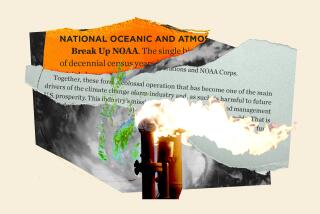GM pulls support for Heartland Institute
Citing its corporate stance that climate change is real, General Motors announced Wednesday that its General Motors Foundation would no longer be funding the Heartland Institute, a free-market think tank that has attacked human-caused global warming as âjunk science.â
The announcement was not made in a company statement, but rather in communications with Greg Dalton of Climate One, an ongoing dialog about the environment at the Commonwealth Club in San Francisco.
âGeneral Motors has decided to discontinue funding of the Heartland Institute, an organization that downplays the risks of climate disruption, three weeks after GM Chairman and CEO Dan Akerson was asked about it during a Climate One radio interview,â says the first graph of the Wednesday post on the Climate One site.
âYep, itâs true,â said Greg Martin, a GM spokesperson. âDan Akerson was giving remarks at the Commonwealth Club in San Francisco a few weeks ago, and the issue of GMâs very modest and previous contribution to Heartland came up, and Mr. Akerson said heâd look into it. And weâve looked into it, and weâve decided to discontinue it.
âAs Dan said at the Commonwealth Club, GMâs operating its business as if climate change is real.â
The development is fallout from the release of Heartland Institute funding documents in February, which showed that GM contributed $15,000 to Heartland in 2010 and 2011. Peter Gleick, president of the Pacific Institute and a MacArthur âgeniusâ grant recipient, revealed in February that he had assumed a false identity to obtain some of those documents.
In a statement released to the press, Heartland Institute President Joseph Bast said: âThe General Motors Foundation has been a supporter of The Heartland Institute for some 20 years. We regret the loss of their support, particularly since it was prompted by false claims contained in a fake memo circulated by disgraced climate scientist Peter Gleick.â
GMâs decision to halt funding for the institute was the direct result of a campaign by Forecast the Facts, an advocacy group seeking to get TV meteorologists to openly acknowledge climate change. Dan Souweine, the groupâs campaign director, said that his group pored over those Heartland documents and all the funders listed there, which include many other companies, but singled out GM.
âTheyâre out there very actively pushing a green image with high-mileage cars and the Chevy Volt, which is a huge investment, and a number of other things they do on the sustainability side. So funding Heartland, most of what they do is to deny the existence of climate change, and we thought that stood in stark contrast to the image that GM was trying to develop,â said Souweine.
Souweine says his group began flooding GMâs Facebook site with requests to stop funding Heartland, and that they believed GM would respond because of their respect for customer loyalty and because they were sensitive to having taken so-called bailout funds from the federal government.
In early March, Forecast The Facts presented GM with the results of a petition drive in which a reported 20,000 signers asked GM to stop funding Heartland. According to Souweine, more than 10,000 of those signers were current or former owners of GM vehicles.
When Akerson appeared live at the March 7 Climate One event at the Commonwealth Club, Souweine showed up with picketers to try to get Akerson to answer questions about the companyâs support for Heartland. Dalton asked him to cease with the pressure, but did ask Akerson about it in the program.
GM has had a mixed relationship with vehicle innovation, debuting one of the first modern electric production cars in its 1996 EV1, but then famously killing it in 2002. During the Climate One discussion, Akerson pointed out that âactions speak louder than words, and cited the companyâs new electric Chevy Volt in addition to the other small, fuel-efficient cars such as the Chevy Cruze, Chevy Sonic and the Buick Verano.
Souweine said his group is now hitting GMâs Facebook page with thank yous.
RELATED:
Obama limits CO2 emissions from new power plantsHunters, anglers report warming winters bad for wildlife
Clouded readings of EPA study of Dimock water, featured in âGaslandâ






